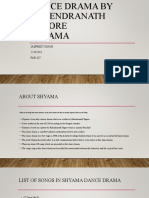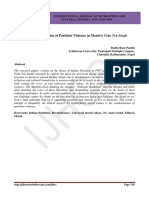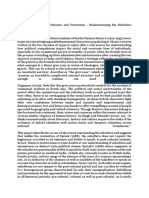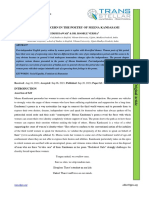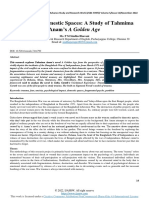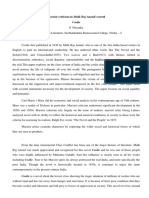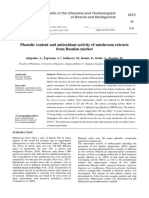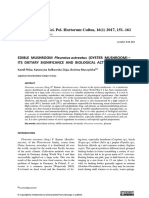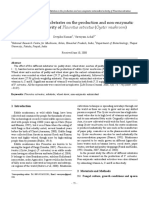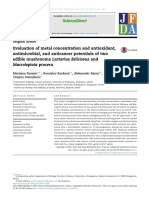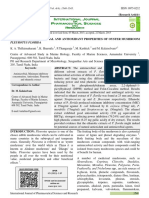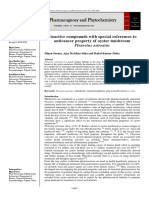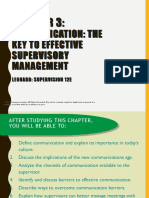The Love of The Loved: Echoes From My Grandmother'S House' by Kamala Das
The Love of The Loved: Echoes From My Grandmother'S House' by Kamala Das
Uploaded by
AKCopyright:
Available Formats
The Love of The Loved: Echoes From My Grandmother'S House' by Kamala Das
The Love of The Loved: Echoes From My Grandmother'S House' by Kamala Das
Uploaded by
AKOriginal Title
Copyright
Available Formats
Share this document
Did you find this document useful?
Is this content inappropriate?
Copyright:
Available Formats
The Love of The Loved: Echoes From My Grandmother'S House' by Kamala Das
The Love of The Loved: Echoes From My Grandmother'S House' by Kamala Das
Uploaded by
AKCopyright:
Available Formats
International Journal of English and Education 490
ISSN: 2278-4012, Volume:2, Issue:2, APRIL 2013
THE LOVE OF THE LOVED: ECHOES FROM ‘MY GRANDMOTHER’S
HOUSE’ BY KAMALA DAS
Mrs.K.L.Rekha, M.A., M.Phil., (Ph.D)
Research Scholar, Manonmanium Sundaranar University,
Assistant Professor of English, Sakthi Engineering College,
Chennai, Tamil Nadu, India.
ABSTRACT: Love is a choice and it springs from appreciating goodness. It need not
happen but can make it happen. Love is active and strong. Love sees good in others
rather than the bad. Love is universal and love can also be unconditional. An
unconditional love is selfless, non-egoistic and relenting. It expects nothing, expresses
everything, bears and holds even the worst of anything, accepts hurts and stripes and
bears bruises, suffers long and kind. All the above stated ingredients of unconditional
love were found in the life of kamala Das’ Grandmother and in the poem ‘My
grandmother’s House’ she yearns for it. In common the love of Grandparents towards
Grandchildren is unconditional and incomparable.
This paper is written based on Kamala Das’ My Grandmother’s House which
envisages the qualities of the ancestral home and the love depicted by Kamala Das.
Keywords: Love, Unconditional love, Loved, appreciating goodness.
One carries the memory of a ‘home’ to which heart retreats in times of anguish.
One feels nostalgic at the thought of happy moments in the past.
Kamala Das is a famous Contemporary Indian writer who is called Kamala Suraiyya who
wrote in English and Malayalam her native language. She is called by the name A.K.A.
Madhavikutty. Kamala Das was born in Punnayurkulam, Thrissur District in Kerala, on March
31, 1934, to V. M. Nair, a former managing editor of the widely-circulated Malayalam daily
Mathrubhumi, and Nalappatt Balamani Amma, a renowned Malayali poetess.She spent her
childhood between Calcutta, where her father was employed as a senior officer in the Walford
Transport Company that sold Bentley and Rolls Royce automobiles, and the Nalappatt ancestral
home in Punnayurkulam.Like her mother, Kamala Das also excelled in writing. Her love of
poetry began at an early age through the influence of her great uncle, Nalappatt Narayana
Menon, a prominent writer. However, she did not start writing professionally until she got
married and became a mother. Her popularity in Kerala is based chiefly on her short stories and
autobiography.
My Grandmother's House
There is a house now far away where once
I received love……. That woman died,
The house withdrew into silence, snakes moved
Copyright © International Journal of English and Education | www.ijee.org
International Journal of English and Education 491
ISSN: 2278-4012, Volume:2, Issue:2, APRIL 2013
Among books, I was then too young
To read, and my blood turned cold like the moon
How often I think of going
There, to peer through blind eyes of windows or
Just listen to the frozen air,
Or in wild despair, pick an armful of
Darkness to bring it here to lie
Behind my bedroom door like a brooding
Dog…you cannot believe, darling,
Can you, that I lived in such a house and
Was proud, and loved…. I who have lost
My way and beg now at strangers' doors to
Receive love, at least in small change?
Kamala Das, the Indian poetess recalls her ancestral home and her dead grandmother in the poem
“My Grandmother’s House”. Kamala Das’ poems as well her imagery is extremely personal and
drawn from life. This poem takes the form of a confession comparing her present broken state
with that of being unconditionally loved by her grandmother. Published in 1965 in summer in
Calcutta the poem is a reminiscence of the poetess’ grandmother and their ancestral home in
Punnayurkulam in Kerala. Her memory of love she received from her grandmother is associated
with the image of her ancestral home.
‘There is a house now far away….
I received love………………….’
The poem begins like a story introducing a house which was visited long back and it’s too far
from the place where the poetess lived at the same time it indicates the farness of the
embracement that Kamala Das once received. But one thing is clear, the house is still there
physically standing without any live activity in it. The poetess expresses very clearly that love
was received, which throws light on the fact that now she is bereft of love and that’s why she
craves for that which is lost. The poet now lives in another city, a long distance away from her
grandmother’s house. But the memories of her ancestral house make her sad. She is almost heart-
broken. The intensity of her emotions is shown by the ellipses in the form of a few dots. Now, in
another city, living another life, she longs to go back. With the death of the Grandmother, the
house ceased being inhabited. It now became an isolated and remote entity, echoed by the phrase
'far away'. The poetess asserts that with the death of her grandmother, silence began to sink in the
house.
‘……….That woman died,
The house withdrew into silence,………’
The poem is a reminiscence of the poetess’ grandmother and their ancestral home at Malabar in
Kerala. Her remembrance of love she received from her grandmother is associated with the
Copyright © International Journal of English and Education | www.ijee.org
International Journal of English and Education 492
ISSN: 2278-4012, Volume:2, Issue:2, APRIL 2013
image of her ancestral home, where she had spent some of the happiest days of her life, and
where her old grandmother had showered her love and affection. With the death of her
grandmother the house withdrew into silence. When her grandmother died, even the house
seemed to share her grief, which is poignantly expressed in the phrase “the House withdrew”.
The house soon became desolate and snakes crawled among books. Her blood became cold like
the moon because there was none to love her the way she wanted.
She understands that she cannot reclaim the past but she wants to go back home, look
once again through its windows and bring back a handful of darkness – sad and painful
memories, which she would have made her constant companion, to keep as a reminder of her
past happiness. The poet is unable to proceed with her thoughts for sometime as is indicated by
the ellipses (dots). The poet is now garroted with the intensity of grief. She hankers for love like
a beggar going from one door to another asking for love in small change. Her need for love and
approval is not satisfied in marriage and she goes after strangers for love at least in small
quantity. But she does not get it even in small change or coins. Her love-hunger remains
unsatisfied, and there is a big void, a blank within her, she seeks to fill up with love but to no
avail. The image of the window is a link between the past and the present. It signifies the desire
of the poet for a nostalgic peep into her past and resurrects her dreams and desires.
‘………………….snakes moved
Among books, I was then too young
To read, and my blood turned cold like the moon
How often I think of going
There, to peer through blind eyes of windows or
Just listen to the frozen air,
Or in wild despair, pick an armful of
Darkness to bring it here to lie
Behind my bedroom door like a brooding Dog…’
The moon is being an emblem of love. The worms on the books seem like snakes at that
moment, in comparison to the size of the little girl; and in keeping with the eeriness of the
situation. The poetess also implies that the deserted house is like a desert with reptiles crawling
over. The poetess now longs to 'peer' at a house that was once her own. She has to peek through
the 'blind eyes' of the windows as the windows are permanently closed. The air is frozen now, as
contrasted to when the grandmother was alive-the surroundings were filled with the warmth of
empathy. Kamala Das pleads with us to "listen" to the "frozen" air; that is an impossibility.
Neither is the air a visual medium, nor can air cause any displacement because it is "frozen".
In wild despair, she longs to bring in an "armful of darkness". Note firstly, that it is not a
'handful' but an armful. Secondly, 'darkness' that generally has negative shades to it, has positive
connotations here of a protective shadow. It also reflects the 'coziness' inside the house. This
armful of darkness is her essence of nostalgia.
Copyright © International Journal of English and Education | www.ijee.org
International Journal of English and Education 493
ISSN: 2278-4012, Volume:2, Issue:2, APRIL 2013
‘…………….you cannot believe, darling,
Can you, that I lived in such a house and
Was proud, and loved….’
Kamala Das was very proud about her grandmother and the love she received. The Ellipsis after
the word loved shows how much she grieves at the loss of the person who unconditionally loved
her and satisfied her to the core. She was so convinced by the environment in which she lived,
that the loss of it was indigestible, and uncompromisable. She feels so proud of her grandmother
and the house in such a way that she wants all the others know how promising and satisfying was
the atmosphere at the grandmother’s house.
‘…………..I who have lost
my way and beg now at strangers' doors to
Receive love, at least in small change?’
The pronoun ‘I’ here is very emphatic and also melancholic. Emphatic in order to tell the world
that no one would or could have come across such an admiring part of life the poetess lived and
melancholic to let the readers know that she is a great loser and there can be no loser like her in
the world. It also echoes her inner reverberations that when her grandmother was alive she was
rich with love and after her demise she became bankrupt and started begging at stranger’s door.
She dint expect the equal amount of love that she received from her grandmother from the
society she was in but only little. Even that little love she was deprived of. This makes it clear
that Kamala Das’ grandmother was an embodiment of unconditional love.
Why grandchildren are much attached to grandparents than the parents?
This is a common tendency which one witnesses in the any family for that matter.
Generally most of the grandchildren get more attached and engrossed and enthralled by their
grandparents’ selfless and unconditional love. It is because of the fact they are pampered and
petted among all odds they commit. Grandparents are more matured than the parents to handle
the immatured and the innocents in turn the grandchildren get more attached to the grandparents.
The reasons for grandparents being loved by grandchildren are enumerated by Jacqueline Carroll
Grandparents
Are up for adventure as the kids do.
Know many stories.
Can grow things (garden) in which kids like to soil their hands.
Are great guides.
Are not afraid to be silly. Did a grandchild make a mask or a funny hat?
grandparents will try it on.
Let grandchildren take their own time for any task.
Make best audience even if it is silly.
Copyright © International Journal of English and Education | www.ijee.org
International Journal of English and Education 494
ISSN: 2278-4012, Volume:2, Issue:2, APRIL 2013
Have coolest pets to share with the kids.
Love to travel.
Know tons of good songs the kids like.
Are patient listeners always optimistic.
Are always thrilled to hear something from the kids
Are walking history books.
Send kids the coolest care packages when they go away to camp, to college, or
just for the fun of it.
Sometimes pay grandchildren for household works.
Believe whatever stories grandchildren want them to believe.
Have skills to teach grandchildren which can’t be learnt in school.
We will snuggle up on the couch, when grandchildren aren't feeling well.
Read favorite books to them, over and over again.
Stay in touch and make sure grandchildren know that they’re thinking about them
even if they live far away.
Let grandchildren teach us things, like how to use a cell phone and share photos
online.
Want to make every day they spend with their grandchildren special.
Love grandchildren unconditionally.
When there are so many things that grandparents could impress grandchildren obviously the
feelings of the poetess Kamala Das proves true and eternal.
The poem springs from her own disillusionment with her expectation of unconditional
love from the one she loves. In the poem, the image of the ancestral home stands for the strong
support and unconditional love she received from her grandmother. The imagery is personal and
beautifully articulates her plight in a loveless marriage. Thus, the old house was for her a place
of symbolic retreat to a world of innocence, purity and simplicity, an Edenic world where love
and happiness are still possible.
“Love is a behavior." A relationship thrives when lover and the loved are committed to behaving lovingly
through continual, unconditional giving ― not only saying, "I love you," but showing it.
- Dr. Jill Murray
References:
1. http://www.thegeminigeek.com/who-was-kamala-das/
2. http://www.poemhunter.com/my grandmother’s house
3. http://www.wikipedia.org/wiki/kamaladas
4. http://www.wikipedia.org/wiki/love
5. www.shvoong.com
Copyright © International Journal of English and Education | www.ijee.org
You might also like
- The Castle of Otranto and The Mysterious Mother - Horace Walpole, Frederick S. FrankDocument358 pagesThe Castle of Otranto and The Mysterious Mother - Horace Walpole, Frederick S. FrankMrConanDNo ratings yet
- Feminism in Kamla Das' PoetryDocument75 pagesFeminism in Kamla Das' PoetryShivangiNo ratings yet
- Smelly ClydeDocument10 pagesSmelly ClydeStacey Conchita SimmonsNo ratings yet
- My Grandmother's House PDFDocument1 pageMy Grandmother's House PDFSahifa AslamNo ratings yet
- I BA - Gen Eng Poems - EssaysDocument5 pagesI BA - Gen Eng Poems - EssaysDHINA KARAN S (RA2131201020010)No ratings yet
- LitCharts My Grandmother S HouseDocument7 pagesLitCharts My Grandmother S Houseginnimalia23No ratings yet
- An Analysis of The Poem My GrandmotherDocument2 pagesAn Analysis of The Poem My GrandmotherShivam Thakur67% (3)
- Cambridge Ladies EssayDocument4 pagesCambridge Ladies Essayapi-2635453380% (1)
- I Cannot Live With You PoemsDocument4 pagesI Cannot Live With You PoemsDaeng ArifNo ratings yet
- Presentation Shyama Rabindranath TagoreDocument11 pagesPresentation Shyama Rabindranath TagorekhalsaamanNo ratings yet
- Alliterative Revival in The Middle English PeriodDocument2 pagesAlliterative Revival in The Middle English PeriodSubhankar Acharjya100% (1)
- Jibanananda Das's "Banalata Sen": An Utter MysteryDocument13 pagesJibanananda Das's "Banalata Sen": An Utter MysteryFarhana YeasminNo ratings yet
- Victimization As A Dominant Theme in The Playsilence The Court Is in Session by Vijay TendulkarDocument3 pagesVictimization As A Dominant Theme in The Playsilence The Court Is in Session by Vijay TendulkarInternational Journal of Innovative Science and Research TechnologyNo ratings yet
- SLM-4th Sem English - Spectrum-Lit & Contemporary Issues PDFDocument29 pagesSLM-4th Sem English - Spectrum-Lit & Contemporary Issues PDFshahana s100% (2)
- Leading Themes in Ice-Candy-Man: Dead by K.S. Duggal, The Dark Dancer by B.Rajan, Sunlight On A Broken Column by AttiaDocument3 pagesLeading Themes in Ice-Candy-Man: Dead by K.S. Duggal, The Dark Dancer by B.Rajan, Sunlight On A Broken Column by AttiaHuda BatoolNo ratings yet
- Gandhi As A Mythic Rather Historical Figure in Raja Rao's Kanthapura.Document2 pagesGandhi As A Mythic Rather Historical Figure in Raja Rao's Kanthapura.netflix airtelNo ratings yet
- Robin S Ngangom 2012 6 PDFDocument26 pagesRobin S Ngangom 2012 6 PDFNarges KazemiNo ratings yet
- Representation of Women in Train To PakistanDocument13 pagesRepresentation of Women in Train To PakistanShreeparna DeyNo ratings yet
- Hayavadana by Girish Karnad: R. SharmilaDocument4 pagesHayavadana by Girish Karnad: R. SharmilaRishav RajNo ratings yet
- Regional Ecologies and Peripheral Aesthetics in Indian Literature: Tarashankar Bandyopadhyay'sDocument17 pagesRegional Ecologies and Peripheral Aesthetics in Indian Literature: Tarashankar Bandyopadhyay'sDaffodilNo ratings yet
- A Supermarket in California (Literary Analysis)Document6 pagesA Supermarket in California (Literary Analysis)Johnny An50% (2)
- Theatricality in Andha YugDocument2 pagesTheatricality in Andha YugAtharva DeshmukhNo ratings yet
- The Bengali Novelist Tarashankar BandopadhyayDocument8 pagesThe Bengali Novelist Tarashankar BandopadhyayDEEP BASUNo ratings yet
- Psychological Analysis of Characters in Bankimchandra Chattopadhyay'S Rajmohan'S WifeDocument2 pagesPsychological Analysis of Characters in Bankimchandra Chattopadhyay'S Rajmohan'S WifeRikita MajumderNo ratings yet
- Mulk Raj Anand's CoolieDocument20 pagesMulk Raj Anand's CoolieKarthikNo ratings yet
- Question 1: Discuss The Concept of Sthala Purana' With Reference To The Foreword To Kanthapura by Raja RaoDocument3 pagesQuestion 1: Discuss The Concept of Sthala Purana' With Reference To The Foreword To Kanthapura by Raja RaoSoumya SharmaNo ratings yet
- Maneater of Malgudi: Submitted To: Dr. Manoj Kumar Submitted By: Koysha Katiyar B.A. - (H) - ENGLISH/SEM 3Document7 pagesManeater of Malgudi: Submitted To: Dr. Manoj Kumar Submitted By: Koysha Katiyar B.A. - (H) - ENGLISH/SEM 3Koysha Katiyar100% (1)
- Arun Kolatkars Jejuri Perspective Modern PDFDocument13 pagesArun Kolatkars Jejuri Perspective Modern PDFEdificator BroNo ratings yet
- Dr. Ratan Thiyam, The Exponent of The Modern Indian TheatreDocument5 pagesDr. Ratan Thiyam, The Exponent of The Modern Indian Theatreshilpa rayNo ratings yet
- India - A Fable by Raja Rao, 1978Document6 pagesIndia - A Fable by Raja Rao, 1978THANNU PNo ratings yet
- Chandalika: Rabindranath TagoreDocument13 pagesChandalika: Rabindranath TagoreDharvi MohataNo ratings yet
- Reading Poetry: Lesson 21: Beyond The Ash Rains' by Agha Shahid AliDocument7 pagesReading Poetry: Lesson 21: Beyond The Ash Rains' by Agha Shahid AliJaya DasNo ratings yet
- Nationalism in Shadow LinesDocument2 pagesNationalism in Shadow LinesAyan DasNo ratings yet
- Rohinton Mistry, 'Swimming Lessons'Document18 pagesRohinton Mistry, 'Swimming Lessons'aaasNo ratings yet
- Abstract On "Dawn at Puri" by Jayanta MahapatraDocument10 pagesAbstract On "Dawn at Puri" by Jayanta MahapatraVada DemidovNo ratings yet
- Forest FireDocument4 pagesForest FirePranathi DivakarNo ratings yet
- The Poetry of Toru DuttDocument10 pagesThe Poetry of Toru DuttKishore Lakhsmi100% (1)
- Characterizationin Ice Candy Manby Hasanat AhmadDocument11 pagesCharacterizationin Ice Candy Manby Hasanat AhmadMusa KhanNo ratings yet
- TH THDocument7 pagesTH THReshmaNo ratings yet
- Moral Condemnation of Partition Violence in Manto's Toba Tek SinghDocument9 pagesMoral Condemnation of Partition Violence in Manto's Toba Tek SinghFizza SattarNo ratings yet
- Manto 1Document8 pagesManto 1CenwyNo ratings yet
- 'Waking in The Dark,' Dorothy Livesay - A Sudden Line of PoetryDocument2 pages'Waking in The Dark,' Dorothy Livesay - A Sudden Line of PoetryAlvin OmegasNo ratings yet
- Novel Firdause KangaDocument17 pagesNovel Firdause Kangaaesthetic lyricsNo ratings yet
- Perumal Murugan - WikipediaDocument5 pagesPerumal Murugan - WikipediaBinesh RBNo ratings yet
- 10 - Chapter 4 The Good Person of Schwan PDFDocument33 pages10 - Chapter 4 The Good Person of Schwan PDFpurnimaNo ratings yet
- Biblio Review..BhimayanaDocument2 pagesBiblio Review..BhimayanaKamala OinamNo ratings yet
- Unit 5 Nirad C. Chaudhuri: ObjectivesDocument16 pagesUnit 5 Nirad C. Chaudhuri: ObjectivesRohit Saha0% (1)
- Thematic Concern in The Poetry of Meena Kandasami: Jagdish Dawar & Dr. Rooble VermaDocument6 pagesThematic Concern in The Poetry of Meena Kandasami: Jagdish Dawar & Dr. Rooble VermaTJPRC PublicationsNo ratings yet
- Trauma in Domestic Spaces: A Study of Tahmima Anam's A Golden AgeDocument5 pagesTrauma in Domestic Spaces: A Study of Tahmima Anam's A Golden AgeInternational Journal of Advance Study and Research Work100% (1)
- Marginalisation of Indigent in CoolieDocument5 pagesMarginalisation of Indigent in CooliepriyankaNo ratings yet
- Nora PDFDocument50 pagesNora PDFJigar PathakNo ratings yet
- Kamala Das - An IntroductionDocument5 pagesKamala Das - An IntroductionANKIT KUMAR DUBEYNo ratings yet
- Locating Cultures in North East PoetryDocument14 pagesLocating Cultures in North East PoetryKaushik Ray100% (1)
- CHAPTER 4 Thesis On Girish Karnad's PlayDocument60 pagesCHAPTER 4 Thesis On Girish Karnad's PlayAditya singhNo ratings yet
- English Paper IIIDocument52 pagesEnglish Paper IIIGuruKPONo ratings yet
- RebatiDocument15 pagesRebatiAjay Ashok0% (1)
- The Indian Emperor: "Boldness is a mask for fear, however great."From EverandThe Indian Emperor: "Boldness is a mask for fear, however great."No ratings yet
- 319Document52 pages319AKNo ratings yet
- 162 M2042Document10 pages162 M2042AKNo ratings yet
- Combination Effect of Edible Mushroom - Sliver Nanoparticles and Antibiotics Against Selected Multidrug Biofilm PathogensDocument7 pagesCombination Effect of Edible Mushroom - Sliver Nanoparticles and Antibiotics Against Selected Multidrug Biofilm PathogensAKNo ratings yet
- Antimicrobial and Antioxidant Properties of Trametes Gibbosa (Pers) FR.Document4 pagesAntimicrobial and Antioxidant Properties of Trametes Gibbosa (Pers) FR.AKNo ratings yet
- 14Document5 pages14AKNo ratings yet
- A GC-MS Study of The Volatile Organic Composition of Straw and Oyster Mushrooms During Maturity and Its Relation To Antioxidant ActivityDocument7 pagesA GC-MS Study of The Volatile Organic Composition of Straw and Oyster Mushrooms During Maturity and Its Relation To Antioxidant ActivityAKNo ratings yet
- 5 5 8 Alispahi PDFDocument4 pages5 5 8 Alispahi PDFAKNo ratings yet
- Antioxidant Assay of Gold and Silver Nanoparticles From Edible Basidiomycetes Mushroom FungiDocument6 pagesAntioxidant Assay of Gold and Silver Nanoparticles From Edible Basidiomycetes Mushroom FungiAKNo ratings yet
- Acta Sci. Pol. Hortorum Cultus, 16 (1) 2017, 151-161Document11 pagesActa Sci. Pol. Hortorum Cultus, 16 (1) 2017, 151-161AKNo ratings yet
- 12 Life0503 73 76 EffectDocument4 pages12 Life0503 73 76 EffectAKNo ratings yet
- 1 s2.0 S1021949816000156 MainDocument8 pages1 s2.0 S1021949816000156 MainAKNo ratings yet
- Antioxidant and Antimicrobial Activities of Oyster Mushroom: January 2017Document7 pagesAntioxidant and Antimicrobial Activities of Oyster Mushroom: January 2017AKNo ratings yet
- WHITE OYSTER MUSHROOM (Pleurotus Florida) Mutant With Altered Antioxidant ContentsDocument8 pagesWHITE OYSTER MUSHROOM (Pleurotus Florida) Mutant With Altered Antioxidant ContentsAKNo ratings yet
- Studies On Antimicrobial and Antioxidant Properties of Oyster MushroomDocument6 pagesStudies On Antimicrobial and Antioxidant Properties of Oyster MushroomAKNo ratings yet
- Bioactive Compounds With Special References To Anticancer Property of Oyster MushroomDocument5 pagesBioactive Compounds With Special References To Anticancer Property of Oyster MushroomAKNo ratings yet
- Graduate Aptitude Test - Biotechnology (Gat-B) 2020: Instructions For ApplicantsDocument1 pageGraduate Aptitude Test - Biotechnology (Gat-B) 2020: Instructions For ApplicantsAKNo ratings yet
- Ahmed AntimicroDocument13 pagesAhmed AntimicroAKNo ratings yet
- M.SC - Plant Biology & Biotechnology - 2015Document19 pagesM.SC - Plant Biology & Biotechnology - 2015AKNo ratings yet
- One Misfired Spell Later - LosthpfanficwriterDocument347 pagesOne Misfired Spell Later - LosthpfanficwriterAKNo ratings yet
- Comparitive Study On The Antioxidant, Anticancer and Antimicrobial Property of (J. E. Lange) Imbach Before and After BoilingDocument8 pagesComparitive Study On The Antioxidant, Anticancer and Antimicrobial Property of (J. E. Lange) Imbach Before and After BoilingAKNo ratings yet
- (23919531 - Open Agriculture) Cultivation of Agaricus Bisporus (Button Mushroom) and Its Usages in The Biosynthesis of NanoparticlesDocument7 pages(23919531 - Open Agriculture) Cultivation of Agaricus Bisporus (Button Mushroom) and Its Usages in The Biosynthesis of NanoparticlesAKNo ratings yet
- M.SC - Plant Biology & Biotechnology - 2017 PDFDocument17 pagesM.SC - Plant Biology & Biotechnology - 2017 PDFAKNo ratings yet
- M.SC - Plant Biology & Biotechnology - 2010Document19 pagesM.SC - Plant Biology & Biotechnology - 2010AKNo ratings yet
- RMBI Question Bank (Solved)Document15 pagesRMBI Question Bank (Solved)AK100% (2)
- Male Female Genitalia and Rectum AssessmentDocument76 pagesMale Female Genitalia and Rectum AssessmentKervin EchanoNo ratings yet
- Puzzles - Lilov MethodDocument12 pagesPuzzles - Lilov MethodRa DewNo ratings yet
- 03 Dust of Snow (Poem) EnglishDocument2 pages03 Dust of Snow (Poem) EnglishShanti ChandrasekarNo ratings yet
- English Language 1 توصيف المقرر (1) -محولDocument7 pagesEnglish Language 1 توصيف المقرر (1) -محولnooraNo ratings yet
- Restoring Proximal Caries Lesions Conservatively With Tunnel RestorationsDocument8 pagesRestoring Proximal Caries Lesions Conservatively With Tunnel RestorationsAlfonsius JeriNo ratings yet
- RFP - ZojilaDocument286 pagesRFP - ZojilaRayees AhmadNo ratings yet
- Atmakarka RoleDocument79 pagesAtmakarka Rolesurinder sangarNo ratings yet
- Disillusionment of American Dream in The Great GatsbyDocument2 pagesDisillusionment of American Dream in The Great GatsbytwinkleniyaziNo ratings yet
- Classes & Races, For Gundam EpsilonDocument187 pagesClasses & Races, For Gundam EpsilonCpt. Knight BroahNo ratings yet
- Twin To Twin Transfusion Syndrome (TTTS)Document16 pagesTwin To Twin Transfusion Syndrome (TTTS)Angieda SoepartoNo ratings yet
- 11th STD Bio-Botany Revised EM 2023 Book Back AnswersDocument52 pages11th STD Bio-Botany Revised EM 2023 Book Back AnswerspranavcbeNo ratings yet
- 2nd Quarter 1st Summative Test With TOSDocument2 pages2nd Quarter 1st Summative Test With TOSLeoLeyesaNo ratings yet
- The Political Testament of Adolf Hitler-Feb 1945Document37 pagesThe Political Testament of Adolf Hitler-Feb 1945ΓΕΩΡΓΙΟΣ ΓΕΩΡΓΙΑΔΗΣNo ratings yet
- Jung History I - 2Document28 pagesJung History I - 2Данијела Вукмировић100% (1)
- Learning-Plan-GENERAL MATHEMATICS 11 Lesson 5Document4 pagesLearning-Plan-GENERAL MATHEMATICS 11 Lesson 5Ivy-Jane Natanauan UmandapNo ratings yet
- Five Point MatchDocument24 pagesFive Point MatchAlanNo ratings yet
- Siemens 87L - Compatibility ModeDocument46 pagesSiemens 87L - Compatibility ModeNoptana TummasitNo ratings yet
- Brave New WorldDocument49 pagesBrave New WorldLily LseNo ratings yet
- SSMO Marking SchemeDocument5 pagesSSMO Marking SchemeSTEPCentreNo ratings yet
- LAS MAPEH 9 Q2 W1 MusicDocument7 pagesLAS MAPEH 9 Q2 W1 MusicJemalyn Hibaya Lasaca67% (3)
- Communication: The Key To Effective Supervisory Management: Leonard: Supervision 12EDocument19 pagesCommunication: The Key To Effective Supervisory Management: Leonard: Supervision 12EAnonymous CeyseSDBqNo ratings yet
- Tony Jackson MercuriusDocument9 pagesTony Jackson Mercuriussorin100% (1)
- Constitution and Rules of Asus Welfare AssoricationDocument7 pagesConstitution and Rules of Asus Welfare Assoricationdenisadan1888No ratings yet
- Consumer Behavior Final PPT ProjectDocument39 pagesConsumer Behavior Final PPT ProjectaraNo ratings yet
- Encyclopedia of Gardening PDFDocument496 pagesEncyclopedia of Gardening PDFSuleyman Sadigov100% (2)
- WORKSHEET - Revision 1. Complete The Sentences With The Correct Form of The Verb To Be (Am, Is, Are) or To Have Got (Have Got, Has Got)Document2 pagesWORKSHEET - Revision 1. Complete The Sentences With The Correct Form of The Verb To Be (Am, Is, Are) or To Have Got (Have Got, Has Got)Irina TNo ratings yet
- Sorsogon State University Bachelor of Technical Vocational Teacher EducationDocument5 pagesSorsogon State University Bachelor of Technical Vocational Teacher EducationEmmanuel BoNo ratings yet
- Homeopathy in ColombiaDocument23 pagesHomeopathy in ColombiaFelipe CárdenasNo ratings yet
- Design Methodology For MFB Filters in ADC Interface ApplicationsDocument32 pagesDesign Methodology For MFB Filters in ADC Interface ApplicationspippoNo ratings yet









